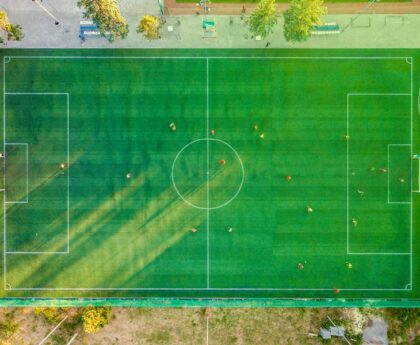Gaff, Rocca, Big Bad Barry: 10 famous finals Tribunal cases
Introduction
In the lead-up to Brayden Maynard’s appearance before the AFL Tribunal, where he hopes to clear his name and continue playing in the finals, we reflect on some of the notable Tribunal cases that have captured the attention of sports fans during past finals. From Andrew Gaff’s infamous punch to Anthony Rocca’s emotional appeal, these cases have not only made headlines but have also shaped the outcomes of finals matches.
1) Andrew Gaff, 2018
Andrew Gaff’s case may have happened in August, but it had significant ramifications for the finals. Gaff received an eight-week ban for a punch that left Fremantle’s Andrew Brayshaw with a broken jaw and dislodged teeth. The suspension was labeled as “historically significant,” as it was one of the longest bans imposed this century. The incident not only ended Gaff’s season but also had a butterfly effect, as West Coast went on to win the premiership without him.
2) Barry Hall, 2005
Barry Hall’s case in 2005 was one of the most famous Tribunal cases of this century. Hall was suspended for striking St Kilda’s Matt Maguire during the preliminary final. Despite the incident occurring 30 meters off the ball, Hall’s legal team successfully argued that his action was part of the play. As a result, Hall was cleared to play in the Grand Final, and he led the Sydney Swans to their first premiership in 72 years. Hall later admitted that he shouldn’t have been allowed to play in the Grand Final.
3) Anthony Rocca, 2003
Anthony Rocca’s case in 2003 involved a two-week ban for striking Port Adelaide’s Brendon Lade during the Grand Final week. Despite a heartfelt appeal that included character references from Peter Schwab and Neville Crowe, Rocca’s ban was upheld. As a result, he missed the Grand Final against Brisbane, leaving Collingwood without one of their star players.
4) Jason Cloke, 2002
In 2002, Jason Cloke was handed a two-game ban just days before the Grand Final for striking Adelaide’s Tyson Edwards. Despite character references from coach Mick Malthouse and his father David Cloke, his appeal failed, and he missed the opportunity to play in the decider against Brisbane. Cloke’s emotional breakdown at the Tribunal showed the devastating impact of such suspensions on players.
5) Jason McCartney, 1999
Jason McCartney, known for his near misses with premiership success, found himself facing the Tribunal in 1999. During a preliminary final, McCartney struck Brisbane’s Clark Keating with a late hit in a marking contest. This incident resulted in a two-week ban, and McCartney was unable to play in North Melbourne’s subsequent Grand Final victory over Carlton. McCartney’s case serves as a reminder of the importance of self-control and impulse management during high-stakes finals matches.
6) Andrew Dunkley, 1996
In 1996, Andrew Dunkley’s case became a landmark event in AFL history. Dunkley was banned for striking Essendon’s James Hird on the eve of the Grand Final. The Swans took the case to the Supreme Court and secured an injunction to delay the hearing until the following week. Although Dunkley was ultimately banned for three games the next season, the saga took a toll on his performance in the decider, contributing to the Kangaroos’ victory. Dunkley’s experience highlights the emotional and psychological toll that Tribunal cases can have on players.
7) Peter Schwab, 1989
Peter Schwab, a Hawthorn champion, missed the iconic 1989 Grand Final due to a three-game ban for a head-high tackle on Essendon’s Andrew Manning in the semi-final. Despite being philosophical about the ban, Schwab admitted that watching his team win the flag from the sidelines was painful. Schwab’s case serves as a reminder of the personal sacrifice players sometimes make for the good of the team.
8) Neville Crowe, 1967
Neville Crowe’s Tribunal case in 1967 is infamous for the “phantom punch” that resulted in his suspension. Crowe was banned for striking Carlton’s John Nicholls in the second semi-final, despite television footage suggesting minimal contact. With television evidence not admissible during Tribunal hearings at the time, Crowe missed Richmond’s premiership win over Geelong in the Grand Final. This case highlights the challenges of making accurate decisions without modern technology.
9) John Coleman, 1951
John Coleman, Essendon’s goalkicking champion, faced an unexpected suspension on the eve of the 1951 finals. A surprise four-week ban abruptly ended Coleman’s season just as the Bombers were gearing up for their premiership campaign. The image of Coleman leaving VFL headquarters in shock and distress remains one of the most iconic photographs in AFL history. Coleman’s absence in the Grand Final against Geelong undoubtedly impacted Essendon’s performance.
10) Gordon Coventry, 1936
Gordon Coventry, a Collingwood legend, experienced his first and only Tribunal case in 1936. Coventry received an eight-week ban for striking Richmond’s Joe Murdoch. Coventry claimed that Murdoch’s repeated punches on painful boils on his neck provoked his retaliation. However, Coventry’s appeal failed, and he was unable to participate in the remainder of the season, including Collingwood’s premiership triumph. The outrage of Collingwood supporters gathered outside VFL headquarters during the hearing further exemplified the emotions surrounding Tribunal cases.
Editorial: The Impact of Tribunal Cases on Finals
Tribunal cases have a significant impact on the finals, as they can determine the availability of star players and ultimately shape the outcome of matches. While it is important to hold players accountable for their actions, there must also be a balanced approach to ensure fairness and the preservation of the spirit of the game.
The AFL Tribunal plays a crucial role in maintaining the integrity of the competition by adjudicating on incidents that occur on the field. However, the inconsistency in decisions and the subjective interpretation of rules by different panels have often resulted in controversial outcomes. These outcomes not only impact individual players but also affect the hopes and dreams of entire teams and their loyal supporters.
The Role of the Tribunal
The AFL Tribunal‘s primary responsibility is to enforce discipline and deter players from engaging in actions that endanger the safety of their opponents. It is crucial for the Tribunal to consider the severity of the incident and its potential consequences when determining appropriate penalties. By doing so, the Tribunal can send a clear message that such behavior will not be tolerated, ultimately promoting a safer sporting environment.
Ensuring Consistency and Fairness
To maintain the integrity of the game, it is essential for the Tribunal to ensure consistency and fairness in its decision-making process. Clear guidelines and precedents should be set to provide clarity for players, clubs, and supporters alike. By establishing a transparent framework, the Tribunal can minimize confusion and controversy surrounding its rulings and create a level playing field for all parties involved.
The Emotional Toll on Players
Tribunal cases during the finals can have a significant emotional impact on players. The stakes are at their highest, with players’ careers and team success hanging in the balance. The stress and uncertainty surrounding a Tribunal hearing can affect a player’s mental state and potentially hinder their performance on the field. Therefore, it is crucial for the AFL to provide appropriate support structures and resources to help players cope with the pressure and aftermath of these cases.
Advice: Navigating the Tribunal
For players facing Tribunal hearings during the finals, it is essential to approach the process with composure and respect. Understanding the gravity of the situation and the potential consequences of their actions can help players present their case effectively.
1. Seek Legal Counsel
Engaging experienced legal counsel can make a significant difference in presenting a strong defense. Lawyers specializing in sports law can offer guidance on strategy and provide valuable insights into the Tribunal process. Their expertise can help players navigate the complexities of the legal system and increase their chances of obtaining a favorable outcome.
2. Demonstrate Remorse and Accountability
Expressing genuine remorse and taking ownership of one’s actions can have a positive impact on the Tribunal‘s decision-making process. Showing a willingness to learn from the incident and highlighting any mitigating factors can help humanize the player and potentially lead to a more lenient penalty.
3. Prepare a Strong Defense
Thoroughly analyzing the incident and gathering supporting evidence can strengthen a player’s case. Video footage, character references, and expert opinions can help provide context and showcase the player’s character and conduct throughout their career. Presenting a comprehensive defense can sway the Tribunal‘s decision in favor of the player.
4. Prioritize Player Well-being
Regardless of the Tribunal‘s outcome, it is important for players to prioritize their well-being and mental health. Seeking support from teammates, coaches, and professional counselors can help players navigate through the emotional challenges that stem from a Tribunal case. By focusing on personal growth and learning from the experience, players can emerge stronger and more resilient.
In conclusion, Tribunal cases have always been an integral part of the AFL finals. While they undoubtedly impact the outcomes of matches, they also provide an opportunity for the league to maintain its commitment to fairness and player safety. By striving for consistency, fairness, and comprehensive support for players, the AFL Tribunal can continue to uphold the integrity of the game while ensuring a safe and enjoyable finals series for all involved.

<< photo by Hazily Light >>
The image is for illustrative purposes only and does not depict the actual situation.
You might want to read !
- “Revealing the Details of an Awkward Visit: Dees Left Livid over Support for…”
Title: “Unveiling an Awkward Visit: Dees Fuming with Support for…”
- US and Vietnam Forge Multi-Billion Dollar Semiconductor and AI Agreements
- G’Day Mate! Here’s a title for an article that explores the winner of The Masked Singer Australia 2023 being leaked:
“Masked Singer Australia 2023: A Sneak Peek at the Leaked Winner”
Hope you like it!
- Uncovering the Battle of Young Talent: England MU17s Hold Morocco in International Clash
- Battle of the Tigers: Sri Lanka vs Bangladesh Clash in Asia Cup 2023 Super Four Showdown
- Smoky Skies: Hazard Reduction Burns Choke Sydney’s Eastern Air
- “Sydney’s Smoke Siege: Battling Hazards and Hazy Climates for Months”
- “Biden’s Diplomatic Discourse: A Collaborative Exchange with Vietnamese President Vo Van …”
- “Life Beyond the Field: Former Origin Star Reflects on Turbulent Journey”
- Joe Burrow’s Struggle: Bengals Quarterback Falters with Career-Low 82 Yards
- Air Quality Plummets in Sydney’s East as Hazard Reduction Burns Continue: A Concerning Conundrum
- “Angus Brayshaw’s Troubling Update: A Heartbreaking Development Involving Brayden”
- Not so fast: Brayshaw’s injury could put Prelim appearance in jeopardy
- “Controversial Incident or Benign Act? Toby Reflects on Blue’s Alleged Eye Gouge”
- “Apple’s Anticipated 2023 Event: Whispers of the iPhone 15 and Apple Watch Surprises”
- “Graphic Injury Alert: Jack Jenkins Horrifically Injured in Brutal UFC 293 Fight!”
- Game Changers: Star Cowboys Who Excelled in Dominant NYG Victory




